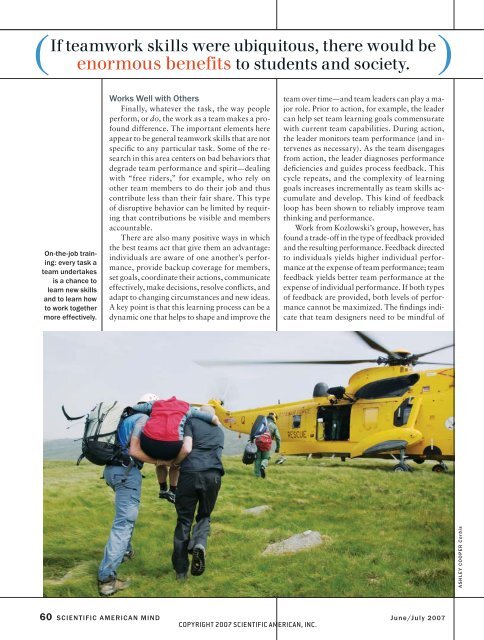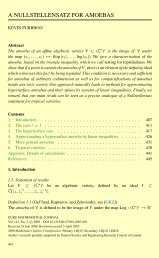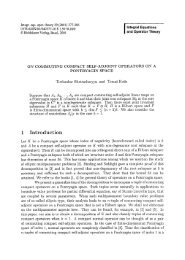Scientific American Mind-June/July 2007
Scientific American Mind-June/July 2007
Scientific American Mind-June/July 2007
Create successful ePaper yourself
Turn your PDF publications into a flip-book with our unique Google optimized e-Paper software.
( If teamwork skills were ubiquitous, there would be )<br />
enormous benefi ts to students and society.<br />
On-the-job training:<br />
every task a<br />
team undertakes<br />
is a chance to<br />
learn new skills<br />
and to learn how<br />
to work together<br />
more effectively.<br />
Works Well with Others<br />
Finally, whatever the task, the way people<br />
perform, or do, the work as a team makes a profound<br />
difference. The important elements here<br />
appear to be general teamwork skills that are not<br />
specifi c to any particular task. Some of the research<br />
in this area centers on bad be haviors that<br />
degrade team performance and spirit—dealing<br />
with “free riders,” for example, who rely on<br />
other team members to do their job and thus<br />
contribute less than their fair share. This type<br />
of disruptive behavior can be limited by requiring<br />
that contributions be visible and members<br />
accountable.<br />
There are also many positive ways in which<br />
the best teams act that give them an advantage:<br />
individuals are aware of one another’s performance,<br />
provide backup coverage for members,<br />
set goals, coordinate their actions, communicate<br />
effectively, make decisions, resolve confl icts, and<br />
adapt to changing circumstances and new ideas.<br />
A key point is that this learning process can be a<br />
dynamic one that helps to shape and improve the<br />
team over time—and team leaders can play a major<br />
role. Prior to action, for example, the leader<br />
can help set team learning goals commensurate<br />
with current team capabilities. During action,<br />
the leader monitors team performance (and intervenes<br />
as necessary). As the team disengages<br />
from action, the leader diagnoses performance<br />
defi ciencies and guides process feedback. This<br />
cycle repeats, and the complexity of learning<br />
goals increases incrementally as team skills accumulate<br />
and develop. This kind of feedback<br />
loop has been shown to reliably improve team<br />
thinking and performance.<br />
Work from Kozlowski’s group, however, has<br />
found a trade-off in the type of feedback provided<br />
and the resulting performance. Feedback directed<br />
to individuals yields higher individual performance<br />
at the expense of team performance; team<br />
feedback yields better team performance at the<br />
expense of individual performance. If both types<br />
of feedback are provided, both levels of performance<br />
cannot be maximized. The fi ndings indicate<br />
that team designers need to be mindful of<br />
60 SCIENTIFIC AMERICAN MIND <strong>June</strong>/<strong>July</strong> <strong>2007</strong><br />
COPYRIGHT <strong>2007</strong> SCIENTIFIC AMERICAN, INC.<br />
ASHLEY COOPER Corbis

















